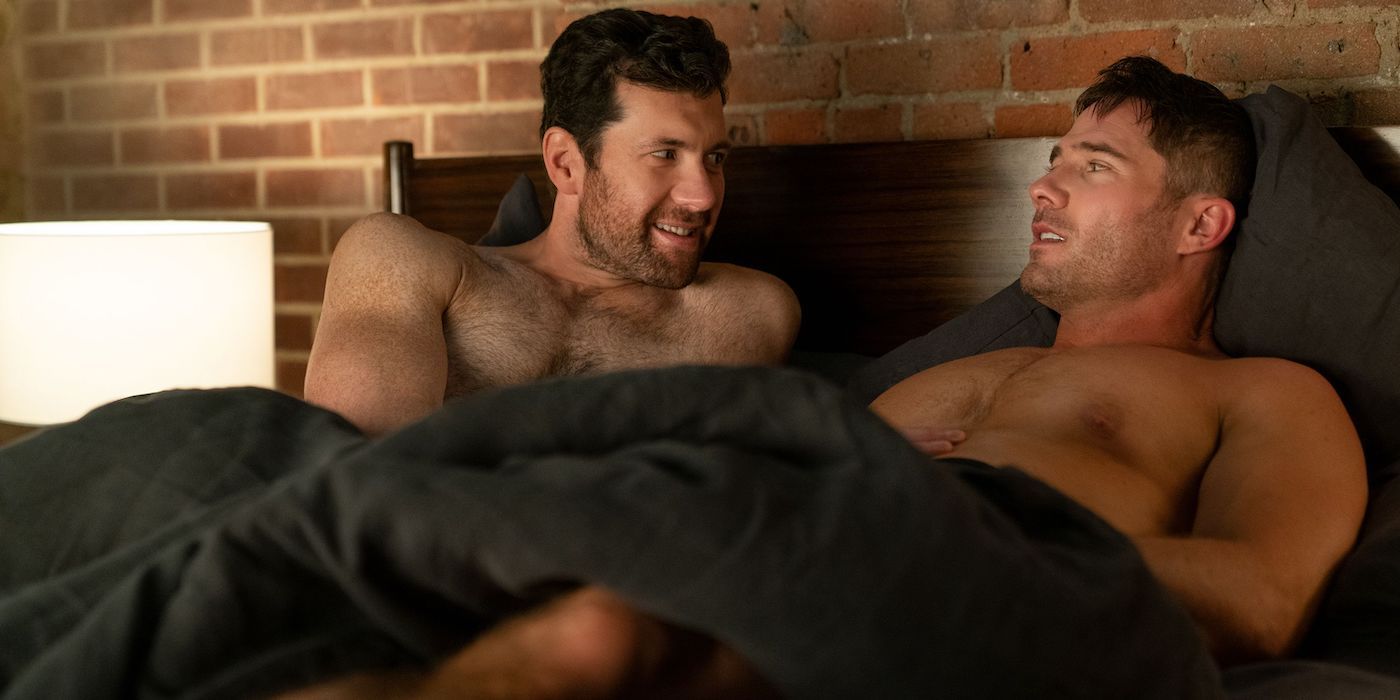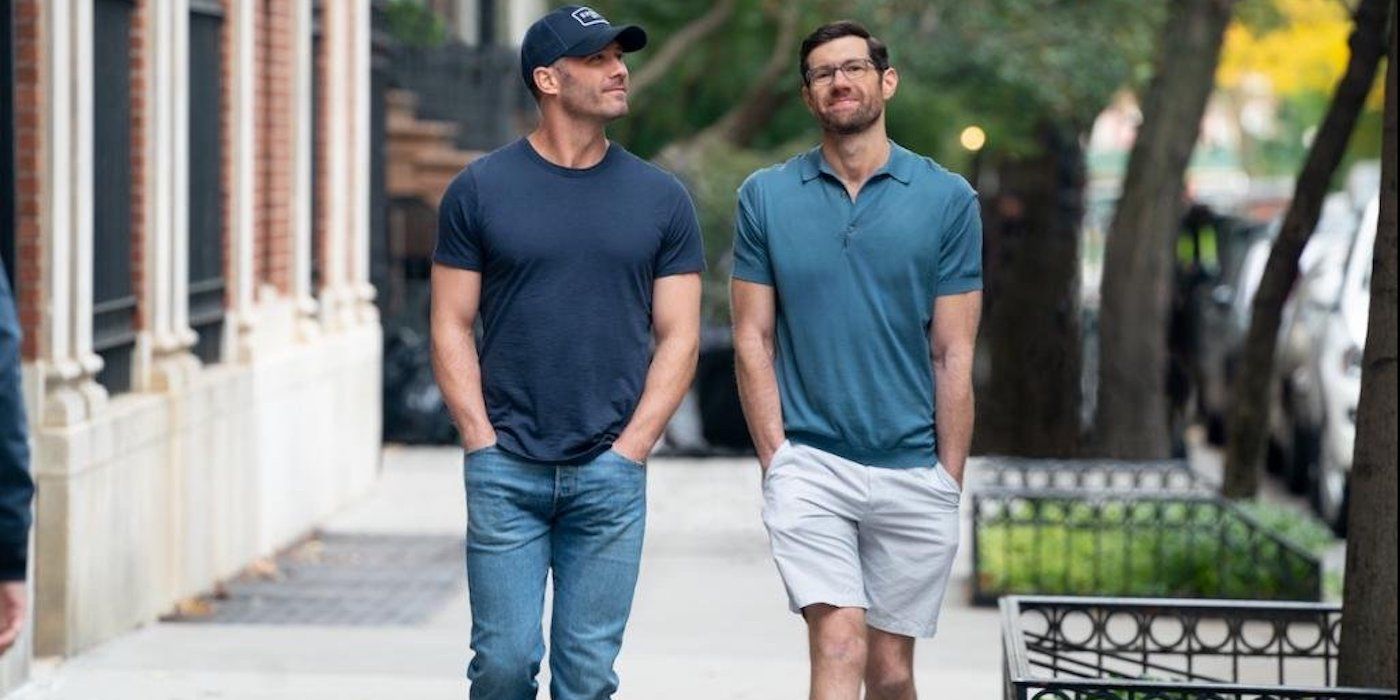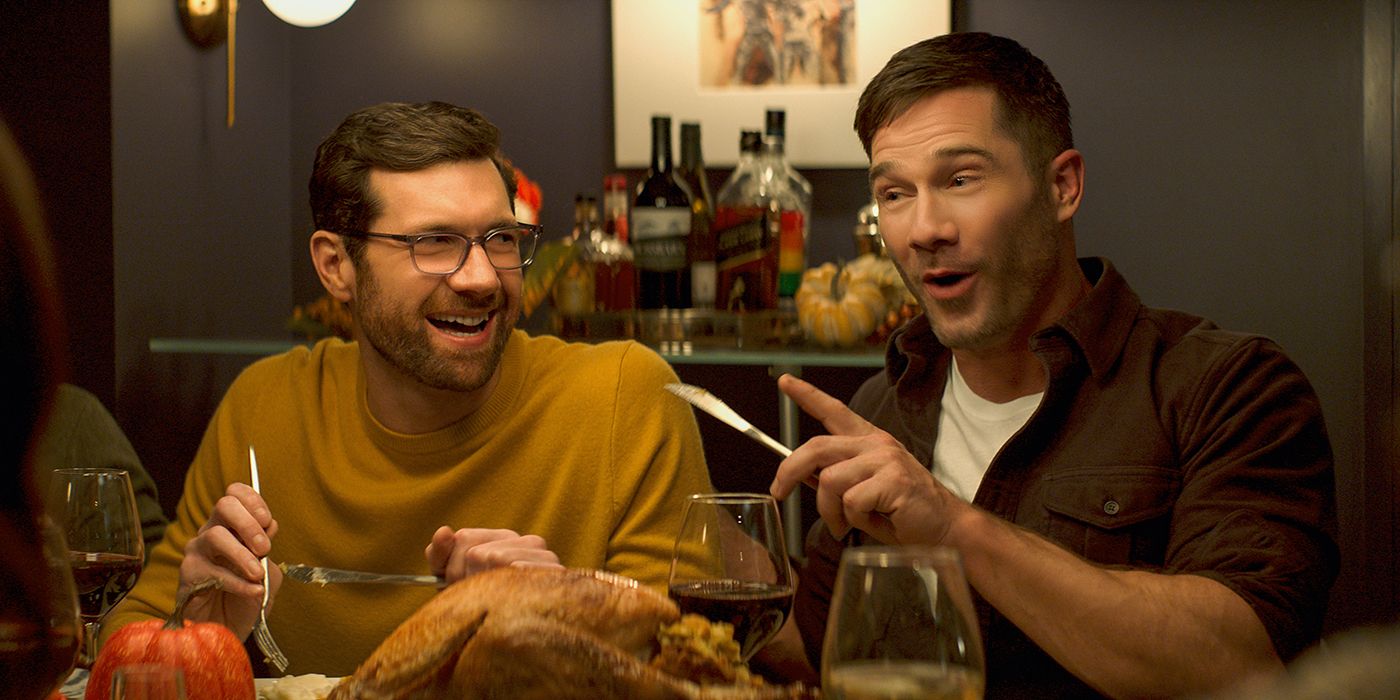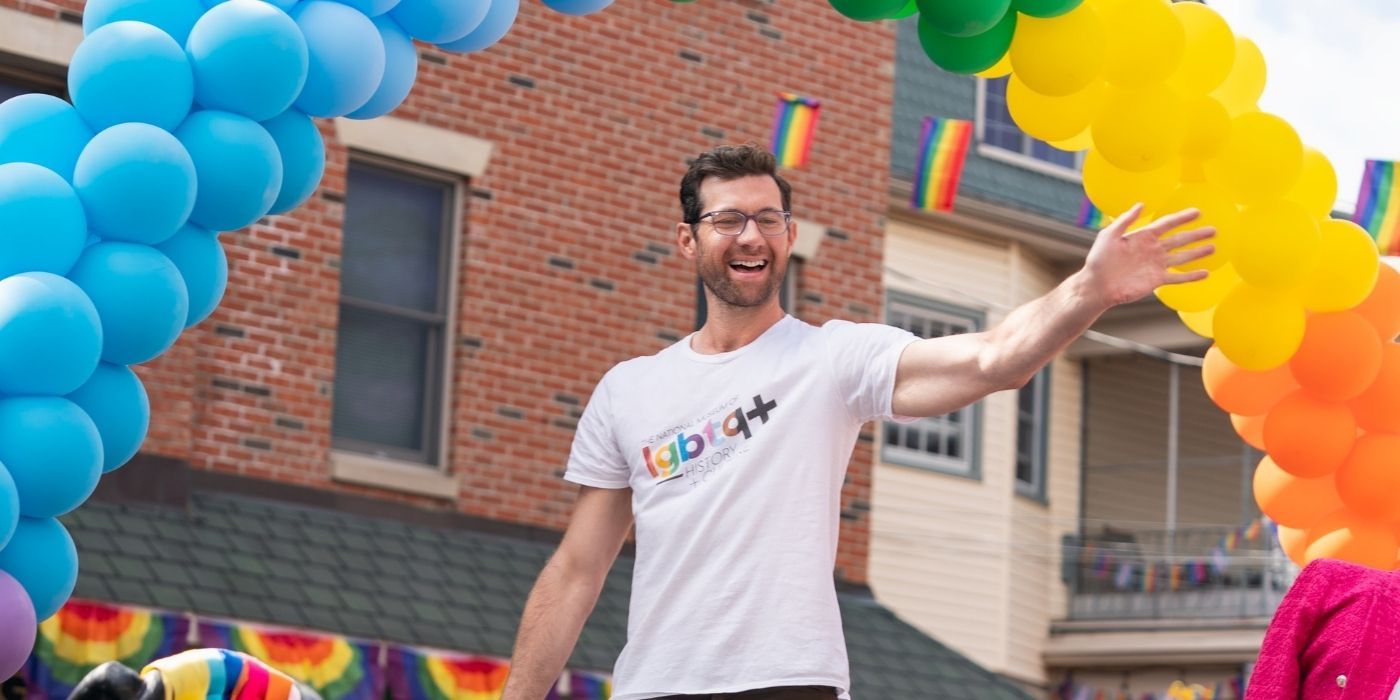Editor's Note: The following contains spoilers for Bros.Thematizing internalized homophobia—the conscious or unconscious self-contempt one feels for their own homosexual identity due to its systemic oppression—is nothing new in cinema. Frequently, it is deployed in high drama films as a detrimental, villainizing force that motivates characters to behave horrifically (American Beauty, The Power of the Dog, etc.). Yet, rarely do films deal with the everyday effects of internalized homophobia, those effects that cause discomfort for the lived experiences of gay people, without veering into sweeping melodrama. Enter Bros, which brilliantly uses its romantic comedy form to deal with this theme on a smaller scale. The film centers on the romance between Bobby (Billy Eichner) and Aaron (Luke Macfarlane), two men configured in the usual “opposites attract” trope of the genre. And yet, their juxtaposition does not just rest on their different personalities, but the different ways in which internalized homophobia informs their lives.
 Aaron Needs to Present Himself As Masculine
Aaron Needs to Present Himself As Masculine
The effects of internalized homophobia are most apparent in Aaron’s characterization. One of the most common consequences of internalized homophobia is the feeling that one is not masculine enough, a side effect of the degradation of qualities perceived as feminine in gay men. Aaron overcompensates for his gayness by conforming to masculine norms. Many of these qualities appear in his first appearance. Aaron is first introduced in the film standing still in the middle of a dance floor. His rigidity immediately situates him as a character uncomfortable with the “feminine” act of dancing. This is exemplified when he mocks a rather feminine gay man as “so stupid.” Through these behaviors, Aaron reveals his obedience to masculinity.
Even more significantly, Aaron is also shirtless in this introduction, displaying his muscular physique. Aaron’s presentation of his masculine body signals his desire to be perceived as masculine by the surrounding gay community. As learned later in the film, Aaron’s concern with his body pushes him to inject himself with testosterone in order to maintain his masculine build. Though the film does not really deal with the effects of self-injections (apparent from Bobby comedically experiencing “roid rage” when he tries steroids), it is clear that Aaron’s concern with his masculinity pushes him to artificially enhance his physique.
The manipulation of his masculinity does not stop at his body, though, as Aaron also manipulates his behavior in order to present as less gay. Early in the film, when Aaron and Bobby encounter a couple from Aaron’s childhood, Aaron introduces Bobby as a “friend,” making no reference to them being on a date. He masks his gayness through omission. Later, when Aaron invites Bobby to spend Christmas with his family, he asks Bobby to tone down his outspokenness so as to not read as “too gay” for his family. As evidenced by his adherence to normative standards of masculinity and his policing of his and others’ gayness, Aaron negotiates his everyday behavior through his internalized homophobia.
Bobby Feels Unworthy of Love
Bobby, seemingly, does not deal with internalized homophobia, as his gayness is intertwined with all aspects of his identity, including his professional and social lives. Bobby hosts a gay-themed podcast, writes inclusive children’s books, and founds an LGBTQ+ museum. In other words, Bobby’s identity seems to be comfortably gay. And yet, he repeatedly undermines his own worth by continually questioning Aaron’s attraction to him. Another cruel consequence of internalized homophobia is the feeling that one is not worthy of love. For Bobby, this effect expresses itself in two ways. One, he repeatedly assumes that Aaron is not sexually attracted to him (he brings this up after their first date, their date in the park, and one of their fights). Two, he constructs an identity built around not being worthy of finding a partner. As he tells Aaron in the aftermath of their breakup, he thinks he's meant to be alone. By questioning both his attractiveness and his capacity for a partnership, Bobby deals with feelings of unworthiness.
The budding relationship between Bobby and Aaron allows them both to relieve themselves of the pressures of their own self-contempt. After their first one-on-one sexual encounter, Bobby cuddles with Aaron, demonstrating his comfortability with him, and therefore, letting his guard down about not feeling sexually desirable. On a trip to Provincetown, Bobby playfully criticizes Aaron’s refusal to dance, inciting a shared dance between the two. Here, Aaron allows himself a reprieve from rigid masculinity. The characters are not fully liberated from their internalized homophobia, but they make steps toward freedom.
Bobby and Aaron Overcome Their Issues
Because the film is a romantic comedy, the most significant resolve of the characters’ internalized homophobia comes at the climactic resolution between the two protagonists. Like most rom-coms, Bros’ climax centers on the couple realizing they belong together and reuniting after a break-up. After Aaron gets an unexpected text from Bobby, he travels across town to show up at the reception of Bobby’s museum opening. Bobby sings an original song to Aaron he wrote about their relationship and pursues him after the song. Narratively, the two makeup and the final scenes of the film find the characters free from the effects of internalized homophobia, as their individual issues are not made reference to again. More significant is how they are positioned in their reunion. Bobby, who spends the film feeling unworthy of love, now expresses his affection through song, and confidently moves toward Aaron after he finishes (his confidence is hilariously evidenced by his dismissal of a hilariously placed Debra Messing). Aaron, once concerned with maintaining a strict masculinity, is now in the position of being the vulnerable object of Bobby’s affection. Their romantic resolution thus positions the characters as breaking away from internalized homophobia, which allows them to love themselves and each other.
Internalized homophobia is an inherently complicated issue, and in a heteronormative society, it is nearly impossible to completely escape its effects. As queer rights advocate and gay icon Lizzo once said, “It’s so hard trying to love yourself in a world that doesn’t love you back.” This is why we need films like Bros that deal with the complexities of internalized homophobia on a relatable scale. Unpacking the issues that prevent us from loving ourselves can be the first step toward self-love.



